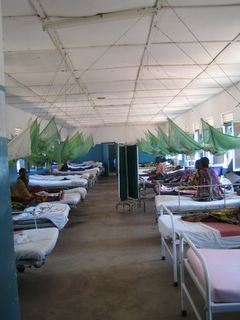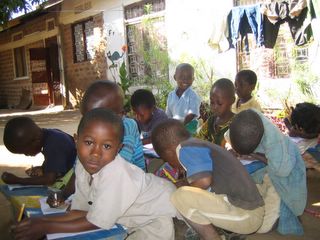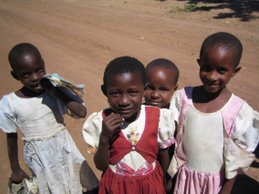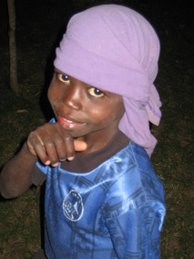13 June 2005
12 June 2005
Reasons my mum's glad I'm in Tanzania
1) I've started praying regularly - The roads are so horrendous here it's hard not to. Although cars, buses and dalla-dallas are normally flying down the road at such speeds it's terrifying, when they slow down I am even more frightened. A sudden stop means we're about to hit something, there's a 'puddle' in the road, or we're about to hit a pothole so massive we might capsize.
2) I'm getting more exercise than I have in my life - I'm lifting, carrying or picking up children all the time, I walk everywhere I possibly can (see above), and my stomach muscles are getting a massive workout going over all the bumps in the road.
3) I don't want to have sex - Spending as much time as I have recently visiting hospitals talking to patients (all female) and health workers (all male) might be the best abstinence programme ever.
Posted by
Natasha
at
6/12/2005 04:35:00 pm
1 comments
![]()
10 June 2005
4 weeks
There are something like 50 children that show up for nursery class every day, ranging in age from three to seven, and in ability from not knowing how to count in Kiswahili to being able to think in English. The ones that are really naughty in class are almost always the brightest children who are really bored by the slowness of the other students. Over the weeks I've learned a lot about the children and managed to put together a group that works really well together. One community boy, Dayo, was absolutely demonic when I taught him the first week in a massive nursery group, but this week he joined my morning class and was incredibly well-behaved and respectful... in the smaller class size I was able to give him enough attention and challenge him so he wasn't bored.
This morning I taught my last class at the orphanage. We spent an hour writing, drawing and colouring, then left for the field where the boys and I played football. I was wearing a skirt and flip-flops, not the best gear for running and kicking (I can imagine my brother laughing at me as I write this) but I really wanted to get the girls involved and thought if I was doing it in a skirt they might join in too. No matter how hard I tried I couldn't get them to join in for longer than it took me to turn around, so after about 1/2 an hour I took them all to the shade and read "The Cat in the Hat" and a few other stories and told them it was our last class together. The children were so sweet and all gave me a hug, I cried when it was time for them to go :(
I can't believe I've been in Tanzania a couple days shy of a month and only have two weeks left. I've gotten used to being called muzungo all the time now. I realise that it isn't meant to be rude, just that people here aren't used to seeing them. Over the weekend when we took the kids to the dance off, Biala was sitting on my shoulders. All of a sudden he says "Madam! Madam! Muzungo!!!" then points at some other white people. Rachel and I asked "Biala what are we?" and he says "Rachel! Tasha!" (pointing at us) then "wazungos" (pointing at the other white people).
Posted by
Natasha
at
6/10/2005 11:34:00 am
0
comments
![]()
09 June 2005
Dirt Rollercoasters
I stopped by Fonelisco today. Joseph and the children gave Max and I a phenomenally warm welcome: the local volunteers sang for us and the children ran up and hugged us when we arrived. Joseph invited me to join him on a trip to one of the rural villages near Mwanza to hear from traditional midwives, so a short while later I jumped into a 4 wheel drive with a Dutch researcher, Joseph and a local translater.
It took about an hour to drive out to the village. I have to say that all my previous reports of awful road conditions were blissfully naive. This was the road to end all roads. There were potholes covering the entire road for the entire journey. We had to drive through giant muddy "puddles" on about a dozen occassions, knowing if we got stuck we'd be the ones to jump out in at least knee deep mud and push the car out. I was extremely grateful to be making the trip in a 4-wheel drive and NOT a dalla-dalla!
When we reached the village, we learned that the women had been waiting all day for us and had just given up and left. We tore off in the direction they had gone to catch them, and spent about an hour rounding them all up again. After so many delays, they were finally able to begin their performance. The women had recently undergone a two week residential training programme through CARE International, during which they had put together skits which warned of dangers in childbirth. Maternal mortality is a major problem in Tanzania, and our long journey to the village showed one of the main reasons: most of the women are spread out really far from hospitals. A contributing factor, is that when women start to have difficulties in childbirth, they are far more likely to consult the local 'witch doctor' than go to the hospital. The witch doctors can't help and often end up delaying the woman so long that she doesn't reach a hospital in time, if at all. These traditional healers acted out the dangers of going to witch doctors and when women should go to the hospital immediately. Their performance was wonderful, drawing a large crowd from passers-by and a very warm response from the onlookers. Work like theirs is a really effective way to educate people and they are doing their communities an enormous service.
Posted by
Natasha
at
6/09/2005 05:05:00 pm
0
comments
![]()
08 June 2005
Condom holes, stigma and 2nd class citizens: AIDS in Tanzania
I've spent most of this week talking to lots of doctors, nurses, specialists and local people about AIDS in Tanzania. For my masters dissertation I'm trying to gather enough information to compare access to ARV treatment (AIDS treatment drugs) in Mwanza region to Metropolitan Washington DC. Getting anything done here takes far more time than I had imagined, and it is only after being here for a few weeks that I am just now managing to successfully meet with people. This week has been an eye opening experience.
On Monday I met with Singira, a doctor at a local dispensary, who told me that the biggest problem by far is that people are afraid of the stigma associated with being HIV+. Singira said that men who contract HIV are usually affluent and well connected. They fear that the community will discover they have AIDS and shun them, so they don't seek treatment even when they obviously have AIDS. When they become very sick, they would rather stay home and die than have the communities know they have AIDS and get treatment. Biologically, women are two to six times more likely to be infected through heterosexual sex with an infected man than a man would be with an infected woman. This usually (although not always) means that men infected with the virus have access to sexual relations with more women because they are wealthier and can attract more partners or can pay for sex, and have therefore been exposed more times. It also means that once they are infected, they can spread the virus more easily to more women.
In Tanzania, women are made much more vulnerable to infection through lack of empowerment and cultural practices that render women more at risk. Women’s initial biological risk increases with each cut or scrape that occurs during sex. Patrice, a staff member of Hisani, told me that FGM (female genital mutilation) is common in rural areas, that 'dry sex' is encouraged to increase male pleasure, and that forced sexual encounters is the norm. These practices are often caused and encouraged by the belief that removing women's desire for sex will keep them faithful. According to Dr. Kabole at AMREF, HIV prevalence rates in Mwanza region are something like 2-4% of all men and about 16-20% of women.
Patrice, two local health workers and I discussed trying to stop the spread of HIV over lunch. I was shocked when the men told me they had never used condoms and asked whether or not they were effective. In the region with one of the highest HIV prevalence rates in the world, health workers didn't believe themselves that condoms worked, and wanted to know what they could tell people who asked the same question. They were dubious about the effectiveness of something that could be destroyed by oil and told me that when you fill a condom with water, some water would form on the outside so there muct be holes in the condoms which the virus could pass through. I tried to explain that water on the outside was most probably caused by condensation, like a glass of water on a hot day, and that condoms are the most effective prevention technique we have. I asked them was it better to use something that has a 3% failure rate or something that has 100% failure rate. They were not entirely convinced so I have promised to bring condoms and air temperature water to the office to try and prove that the water does not go through holes in the condom. We talked for several hours, and all of us agreed that effective prevention techniques were missing and necessary to stop the spread of HIV.
Despite all the depressing things I've heard this week, Dr. Kabole made me feel hopeful this morning. She told me about an exciting microbicide pilot programme that is about to be started in Mwanza region. Microbicides are not yet available, but would prevent the sexual transmission of HIV and other sexually transmitted diseases when applied topically. They would give women the power to protect themselves, and have been very well received in Tanzania, with 98% of the women surveyed enthusiastic about participating in an effectiveness trial. Let's hope development can be sped up and microbicides in general use as soon as possible: millions of lives are at stake.
For more info on anything in this post, please email me: I would be more than happy to answer questions.
Posted by
Natasha
at
6/08/2005 02:16:00 pm
0
comments
![]()
06 June 2005
Snake Charmers
I picked up the clothes I had made on Friday, I've been wearing them ever since and feel much less like a tourist! I am so impressed with them I've decided to have dresses made for all the girls at the orphanage by the same tailor. I hope that they will be ready before I leave so that I can post pictures of them.
On Saturday we loaded up all the children in two dalla-dallas and drove out to Bujora to watch the annual dance off. Unfortunately, as seems to happen with depressing frequency here, the date had been changed from the one posted... so we had 2 dalla-dallas, 2 staff, 13 volunteers and 30-odd children in the middle of nowhere with not much to do. We decided that rather than go home again without seeing anything the children should take a tour of the museum, which they thoroughly enjoyed.
We headed off again on Sunday and arrived with plenty of time to gt comfortable before the dances began. A few minutes later some scraggly looking drummers showed up and pounded out an amazing rhythm... only dissapear again shortly. We were beginning to think the dancers weren't coming when they suddenly pitched up in bright matching costumes. Two troupes were competing against each other, trying to attract the biggest crowd. For three hours we ran back and forth between the two groups... but the tribe that brought out giant snakes to dance with at the end must have won - noone could look away from the spectacle!
Posted by
Natasha
at
6/06/2005 11:53:00 am
0
comments
![]()
03 June 2005
Takwa Hopital
This morning the newer volunteers and I visited the regional hospital in Mwanza. Today the doctors weren't in meetings and were able to give us a tour of the hospital. They have no computers, the files are all done by paper that spills out in an enormous room. The equipment they are using is fairly primitive, and very costly for those that don't qualify for free health care (children under five and pregnant women). One of the doctors told me that they would be greatful for any donations of childrens medications, the need is too great for the meagre funds of the hospital and they cannot afford to stock the necessary medications. We visited the mens ward, and saw the men lying two to a tiny hospital bed. Most patients didn't have sheets, and those that did were lying on dirty ones. The hospital doesn't provide food for patients, so unless you have family that can afford to and live close enough to bring you food, you scrounge other people's left overs or starve. The majority of patients were hopitalised from malaria, a disease that can be prevented by US$10 mosquito nets.
I visited the STI/AIDS/TB ward and spoke to the nurses there for quite some time, and was really inspired by their passion. Tanzania has recently received a lot of funding to combat AIDS (and to a lesser extent TB). The TB programme at the hospital is funded through the Stop TB programme at the WHO. The nurse on duty told me that MDR TB (multi-drug resistant TB) is really low in Mwanza and that patients are usually very good about taking the full course of medication under DOTS (directly observed therapy shortcourse) which is 2 months of coming to the hospital every day and then another 6 months of drugs. TB is the leading cause of death for people with HIV. The hardest thing for people is to pay for transport to and from the hospital, so smaller community programmes are being developed to enable more people to be treated. The ARV nurses spent a long time talking to me and were very helpful. Since October Tanzania has been rolling out a national programme to treat AIDS patients. The nurses told me that the treat under 200 people at the hospital, and that they are trying to scale up the programme as quickly as possible. The major obstacles they have are getting people to the hospital (transportation costs are expensive), the regimen is very complicated and some drugs must be taken with food and some without (for poor people with little resources eating at the right times is difficult), and the stigma attached to HIV makes people less likely to get tested even when they are sick. Despite these obstacles, local people are working really hard to get people treated and keep them alive. The resounding message this morning was: people here know what to do and are trying to do it, all they need is the funding to do it properly.
Posted by
Natasha
at
6/03/2005 08:55:00 am
0
comments
![]()
02 June 2005
Johanes' turns 10
Today was a really long day, but very inspiring. A few days ago I met Joseph, the director of Fonelisco, another orphanage in Mwanza for street kids, at the internet cafe in town. He was looking for a new volunteer and thought I was her. I told Joseph what I was doing in Mwanza and he was very enthusiastic insisting that I must go and visit his orphanage and meet his kids and also offered to put me in contact with people for both the sex ed programme I am putting together for the orphanage and my dissertation research on ARV treatment.
Max and I went over in the late afternoon. We had no idea where we heading but saw a huge crowd of children and jumped out of our taxi. The children swarmed us immediately and talked to us loads, they wanted to know if we would be their teachers and if we would stay and all sorts of things. We went to Joseph's room and he showed us all the things he does to help the orphans: he paints and sells cards, gives drum and dance lessons, assists researchers and has this amazing plan to expand Fonelisco and build a modern hospital which could support far more orphans than he can at the moment. We asked Joseph why he started his orphanage and he answered simply "it is what I can do to help my country."
Max and I trekked back to Hisani in a couple of dalla-dalla's (with her encouragement I stayed on the whole way!) and arrived at 7 just in time to celebrate Johanes' tenth birthday. Some of the children don't even have birth dates, none of them have celebrated before, so this was a big evening. We played musical statues and gave the children biscuits (cookies), bananas and peanuts to celebrate. I've never seen English children dance the way the orphans did! :) Despite our best efforts, we couldn't find a cake anywhere. We had a really nice evening, it was lovely to see them all enjoying themselves so much.
Posted by
Natasha
at
6/02/2005 09:14:00 pm
0
comments
![]()
01 June 2005
quiz: What's the leading cause of death in sub-Saharan Africa?
Yesterday the newer volunteers and I went to the main regional hospital, although the doctors were too busy to show us around (we will go back on Friday) from what we saw of the place it was staggering that people could go there and get better. It was really dirty and open, it seemed impossible that it ever could be clean enough to help people that are ill. Unless you have (and have been tested) for HIV/AIDS, you must pay for medical treatment. In Tanzania, about 20% of the population live on less than US$1 a day, the World Bank's official definition of 'absolute poverty'. Having lived here for a few weeks now, it seems unbelievable that people can survive on that little, and even more impossible that they could pay for medical expenses. I would say on average I'm spending about $15 a day and I don't think I'm spending a huge amount (that's not including travel costs or accomodation).
After the hopital visit in the morning I taught my afternoon nursery class. This class is a lot bigger than the morning class and much harder to keep them all focussed. I am really happy that I have Matungwa, Joyce and Molokus, all Hisani kids, in the class and I'm getting to know them much better. Matungwa is painfully shy and extremely skinny, but he really beams whenever he's given the slightest attention. He's been at the orphanage since the beginning of the year and despite eating tons according to Grace, he's not putting on any weight. Marwa) is also in my class and he's really been coming out of himself this week. Before the volunteers arrived at the Centre, Marwa used to just sit on the ground every day and not really communicate with anyone. This week he's joined in quite a lot and has coloured in some really wonderful pictures in class.
Last night 11 of the 12 volunteers went out to the Chinese place for dinner, which made me feel guilty again, for the above reasons. We had a really nice meal together and piled into two cabs home to go home. Our cab driver seemed fairly relaxed and friendly. We asked him to stop somewhere so that the Irish and Ozzie contingent could buy a few beers for the road, and set off again. As we wound through the backstreets of Mwanza I asked the others what the driver was smoking, as it seemed a bit stronger than a cigarrette. A little while later on the main road my question was answered. We were flying down the road, when all of us spotted a car stopped on the road, all of us except the cab driver. He continued to accelerate towards it until we were a couple of hundred feet from it when he slammed on the brakes. It felt like everything was in slow motion as we skidded towards the car in front, our driver jerked to the side and over the concrete barriers missing by centimetres the open drain on the side of the road and the car in front. We all thought we were going to die so were very relieved to come out unscathed... it wasn't until a few minutes later we realised the cabbie was driving the wrong way back to the compound: through the worst of the damaged roads. The car tipped and swerved around the huge gauges in the dirt road, but we eventually made it home safe and sound. Phew.
Posted by
Natasha
at
6/01/2005 11:16:00 am
0
comments
![]()















